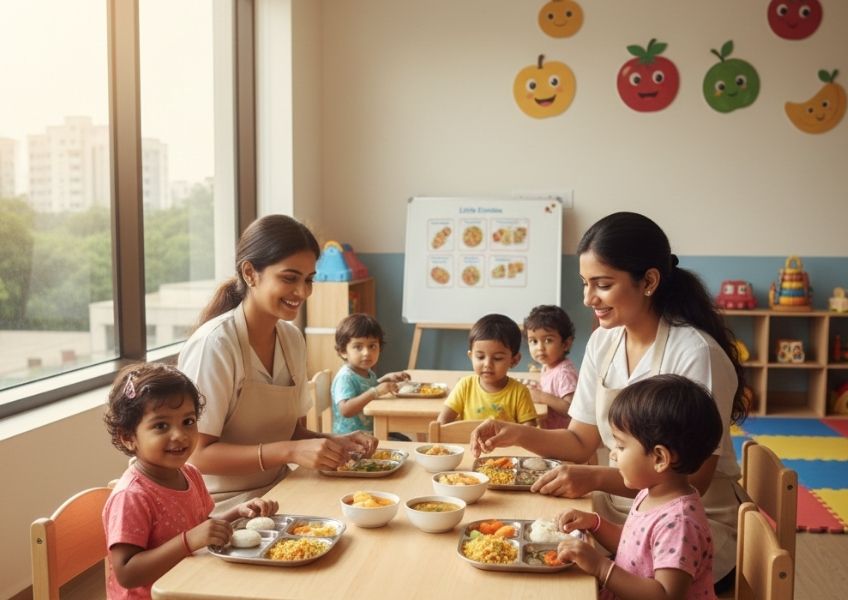As parents, we all want the best for our children especially when it comes to their education. With so many choices out there, figuring out which system suits your child can be overwhelming. If you’ve heard about Montessori and traditional education but aren’t sure how they’re different, you’re in the right place! Let’s break it down together in an easy, relatable way.
How Do Montessori and Traditional Schools Differ?
1. Teaching Methods
Montessori:
Imagine a classroom where kids are excited to choose their own activities. That’s the heart of Montessori education! In these classrooms, teachers act as gentle guides, encouraging children to discover new things at their own pace. There’s a strong focus on hands-on, real-world learning so instead of memorizing facts, students learn through doing. Lessons cater to each child’s learning style, and the materials are designed for independence and self-correction, helping kids build confidence as they go.
Traditional:
On the flip side, traditional schools are more structured. Teachers stand at the front, leading the class and following a set curriculum. Everyone moves through subjects together, aiming to hit the same benchmarks at the same time. The focus is often on listening, note taking, and doing well on tests skills that help measure progress, but sometimes leave little room for individual curiosity.
2. Classroom Environment
Montessori:
Step into a Montessori classroom and you’ll notice immediately how open and inviting it feels. No rigid rows of desks instead, there are different activity stations. Children of various ages work together, which means younger students can learn from older ones, and everyone gets a chance to be both teacher and learner. Natural light, organized spaces, and hands-on tools make it a cozy place for little minds to thrive.
Traditional:
A traditional classroom is a bit more, well, traditional! Most have desks set up in rows, with the teacher at the helm. Kids are usually grouped by age, and everyday routines rarely change. Classroom rules and schedules keep things orderly, but there’s less flexibility to adapt to each child’s unique pace or interests.
3. Student-Teacher Interaction
Montessori:
Montessori teachers see themselves as guides and supporters, not strict authority figures. They spend a lot of time observing each student, stepping in only when needed. This means your child gets individual attention, and mutual respect is at the core of every interaction. It’s a personalized approach that helps kids feel truly seen and understood.
Traditional:
Teachers in traditional settings are more like conductors, making sure everyone is following the same tune. They direct lessons, maintain order, and focus on delivering material to the group. While there’s certainly care and support, the teacher-student relationship tends to be less one-on-one and more about managing the whole class.
4. Learning Outcomes
Montessori:
Kids in Montessori programs often leave with a strong sense of independence, creativity, and critical thinking. Because they’re learning concepts deeply (instead of just memorizing answers for a test), they become great problem-solvers ready for whatever comes their way. The skills they build stay with them for life and foster a love of learning.
Traditional:
Traditional education is geared toward achieving set goals getting good grades, passing exams, and moving up the academic ladder. Students learn discipline, time management, and the importance of meeting expectations. This builds a foundation for academic achievements, though it can be a bit rigid for children who like to explore beyond the syllabus.

5. Assessments
Montessori:
Don’t expect letter grades here! Montessori teachers use ongoing observations, notes, and conversations to understand each child’s progress. This gives a more complete picture of strengths, challenges, and growth over time.
Traditional:
In most traditional classrooms, student performance is measured with tests, quizzes, and assignments. This method helps track academic progress, but may not always capture a child’s unique ways of learning or thinking.
So, Which Is Best for Your Child?
There’s no single answer here every family and every child is unique! If your child loves to explore, is curious, or you want them to learn at their own pace, Montessori could be a great fit. If you value structure and clear benchmarks, traditional schooling might work better for your family.
The important thing is to find an environment where your child can shine and love learning.
Why Families Love Daisy Montessori School
If you’re thinking Montessori might be right for your little one, let us share a bit about Daisy Montessori School. Here’s why our families trust us:
- Safety and Security: Your child’s safety is our top priority. We have thorough safety measures in place to give you peace of mind.
- Home-Like Environment: Our classrooms feel warm and welcoming, so children settle in easily and build their confidence.
- Live CCTV Access: Stay connected, wherever you are parents have live access to classroom cameras for extra assurance.
- Quality Education & Care: Our caring, Montessori-trained teachers help children learn and grow in language, math, science, and social-emotional skills.
- True Montessori Philosophy: Every day, kids learn by doing, discovering their strengths in a nurturing, hands-on environment.
We’re conveniently located near Hennur in Bangalore and offer programs for children aged 12 months to 12 years including preschool, daycare, and afterschool care. Whether you need a safe, caring place for your child, or want to set them on a path of discovery and growth, Daisy Montessori School is here to help.
Decisions like these matter so reach out if you have questions! We’d love to help your family find the perfect place for your child to learn, play, and grow.





